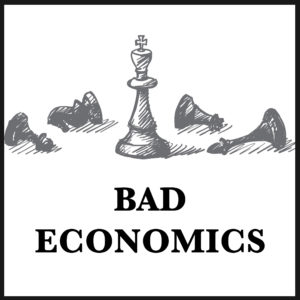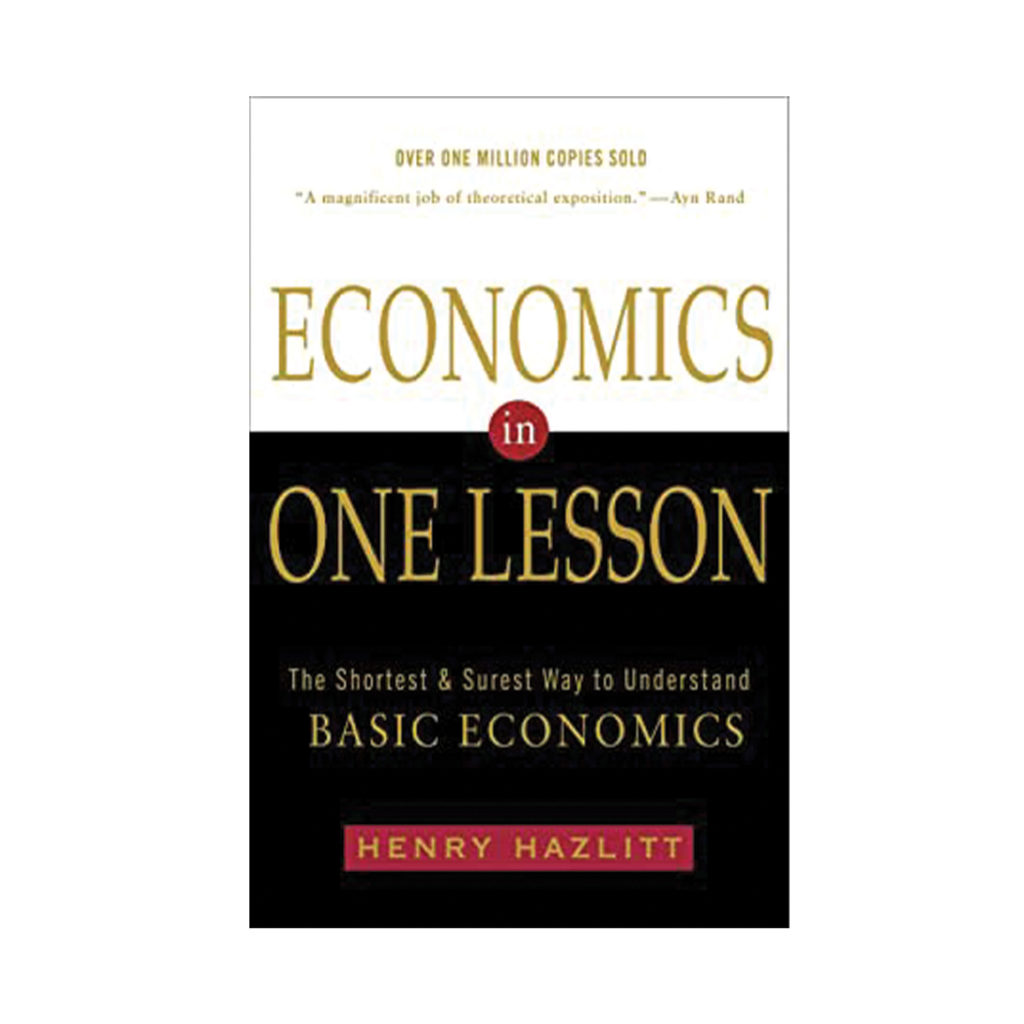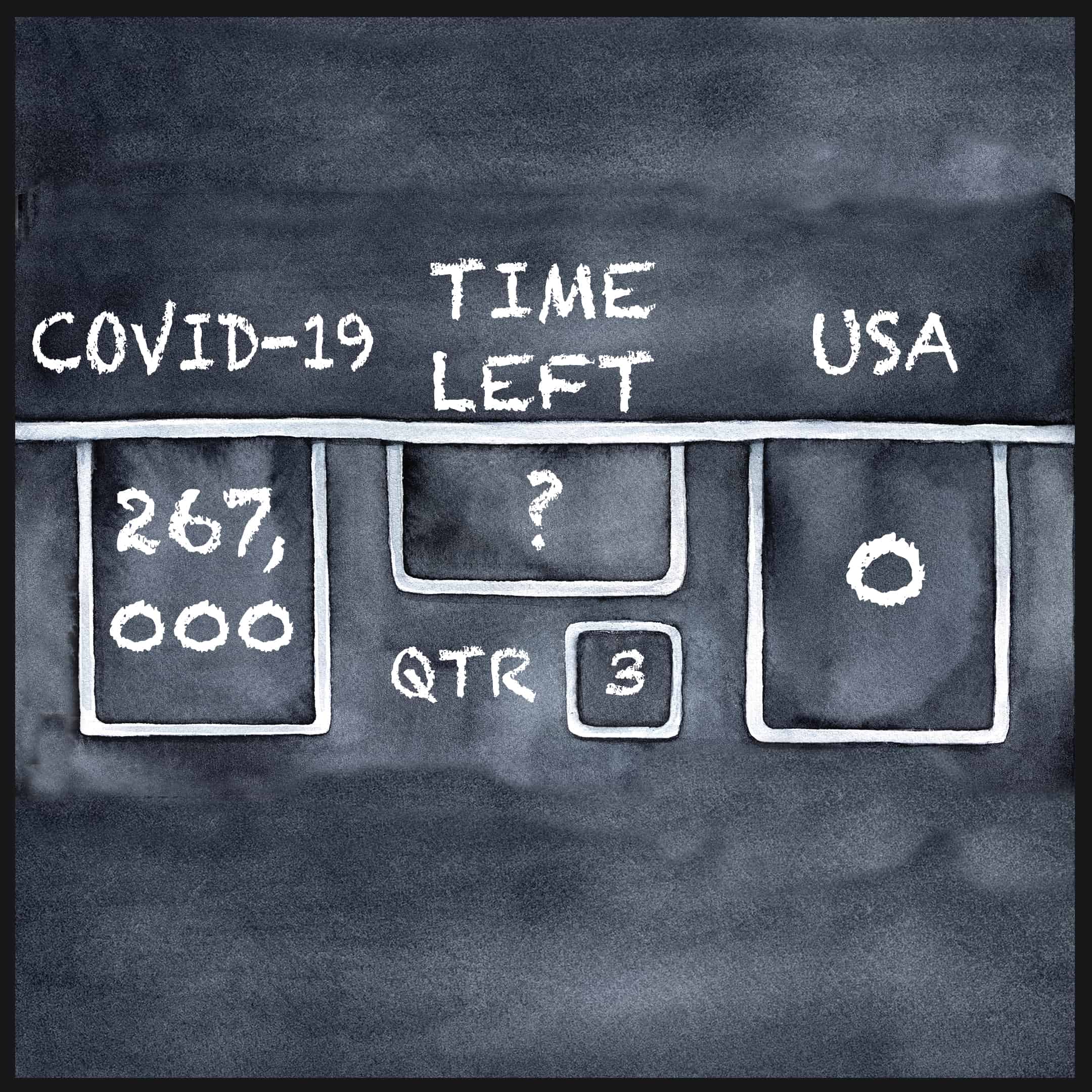Bad economics represents policies that condone suffering, under the guise of liberty, simply because more profit can be derived from this misery.
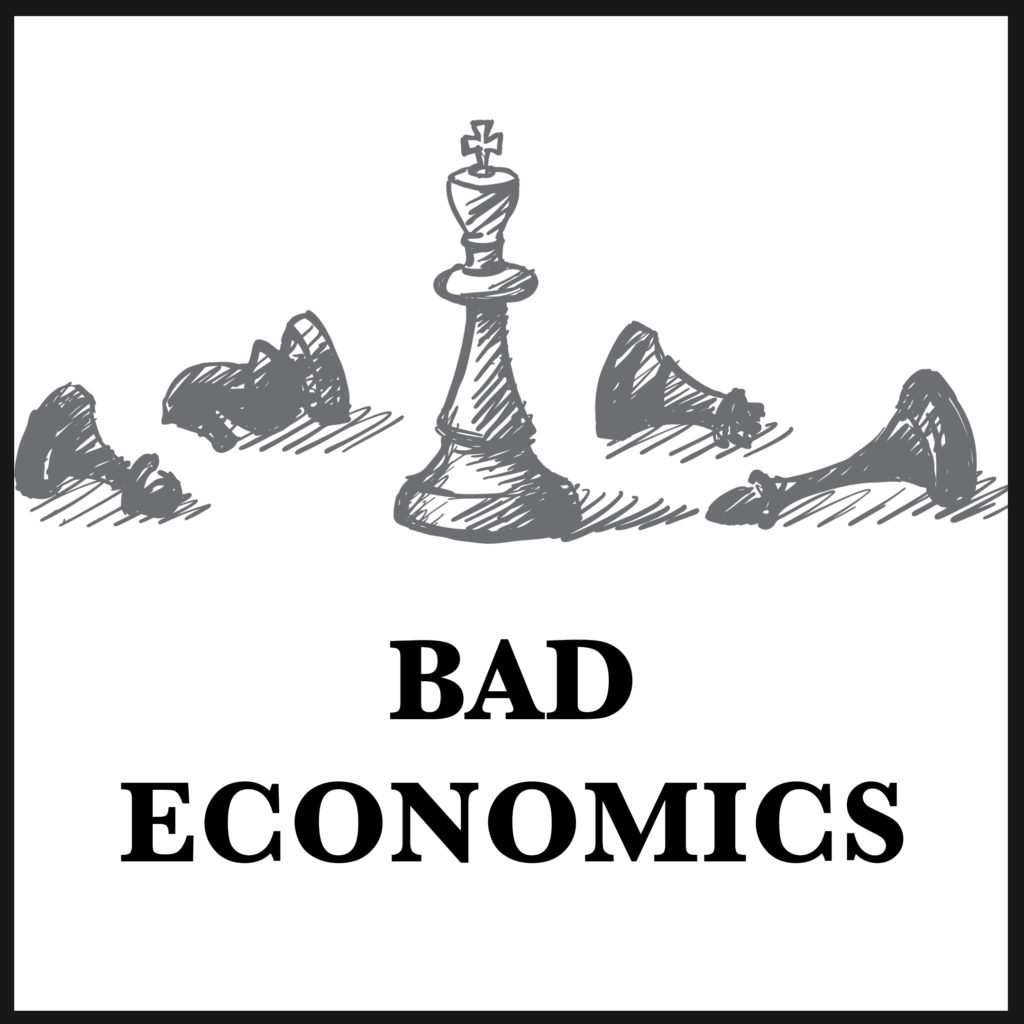
By Robert Simmons
Advancing Economic policies that seek short-term benefits for a select group, often at the expense of other groups…[meanwhile] ignoring the long-term consequences these policies generate…” The “Bad Economics” that makes America great…
Henry Hazlitt
Bad Economics
According to Economist Henry Hazlitt, advances policies that seek only short-term benefits for a select group of people, often at the expense of other groups. It also tends to ignore the direct (and indirect) consequences these policies generate in the long term.
Good Economics
According to Hazlitt, advances policies that benefit all groups, in both the short and long term, because they take into account the “externalities” or ripple effects of a particular course of action.
It is instructive to note that Hazlitt’s book, while praised by many for its theoretical insight, is mostly ignored in practice. In nearly every decision, so-called Bad Economics rules the day.
Even so, we will embrace Mr. Hazlitt’s definition of Good Economics as a worthy starting point in a quest to make economics more efficient and effective for the people who navigate it. We will also apply this same standard to Government, and strive only to advance policies that benefit all groups, in both the short and long term, and take into account the direct and indirect consequences of any particular course of action. This single strategy, if followed by both Government and Economics, will help them work better, and work better together.
The obvious first question is: if we know what’s good for us, why do we continually do the opposite? Hazlitt blames “selfish interests”, who possess the money to influence outcomes, and push policies that favor their personal short-term goals over the good of society.
Mr. Hazlitt has thus concluded that people are selfish and greedy, and ruin the current system of Economics, which ironically, is specifically designed to reward selfishness and greed. To be fair to Mr. Hazlitt, he is not trying to solve anything in his exposition, he is trying to do what most economists do, let us know that Economics is not flawed, it’s the people who use it.
Perhaps this is where the NRA got inspiration for their slogan. Since it is unlikely we could fix seven billion people, let us look instead at this system of Economics, and see if something can be done to make it work in spite of us.
First, let’s separate the science of Economics from our system of Economics, and the social science of Economics that has evolved from it. In the economics of the planet, many organisms compete for survival by attempting to secure essential resources from the Earth’s large but finite supply. This naturally creates a hierarchical structure, where those higher up on the “food chain” feed off of those underneath them. In fact, without this lower “base” or foundation in place, higher forms would have no way to exist.
Our current system of Economics is a story told from a purely human perspective, as the conquerers and subjugators of this planet. Nevertheless, our current system has decided to follow the same hierarchical structure as the planet’s economics, where those at the top of the “food chain”, the wealthy, feed off of those underneath them. Without this lower base of working people, those higher up would have no way to become wealthy.
The system also mimics nature by maintaining a “winner-take-all” feel, where people compete and gamble with and against each other for money, which can be traded in for prizes; by necessity, there will be winners and losers in this arrangement. Unfortunately, lumped among the winnable prizes happens to be essential needs like food and shelter, so if people are on the losing end of Economics, survival is made less certain. This is how government comes to be involved in economics: to adopt the role of both referee and relief fund, in order to secure the unalienable rights of people who might otherwise be weeded out, if the game went on unchecked.
In this way, Democracy has thrown a wrench into the gears of Economics. It is in complete opposition to the tenets of Economics, where no equality actually exists; where survival only goes to the fittest. Once humans subdued all other organisms, it is instructive to note that rather than stop there, we chose to begin subduing our own kind next. We attempt to mask this fact by claiming that some people are not “our kind”, or that money somehow has no correlation to the essential resources it procures, or that profit has no correlation to debt, or that success has no correlation to failure; that in essence, we are all miraculously independent of each other.
It is with this kind of reasoning that governments must be hired to protect people from themselves, or to keep them afloat, so they do not wind up overcrowding our prisons, because underlying the contrived game of monetary Economics is the real game of survival, which dictates that one will do whatever is best and / or easiest in order to survive; what we have labeled “crime” is just another indicator of how the system fails to provide the right amount of certainty and incentive for every one to play along nicely.
Global Capitalism: Prescription For Disaster
Besides this concept of equality, there is still another dilemma: ironically, if one wins too much in any form of Economics, it could end the game for every one. If the human organism consumes so much it destroys the organisms underneath it, it will in effect destroy itself as well. If those on top bleed the rest of society too much, those beneath them would be forced to rise up and remove them from power; we have seen this at the tribal level, community level, national level, and even the international level.
It is time to fashion a system that takes all these factors into account:
- Pay homage to the concept of Democracy, by securing every person’s rights in some equivalent way.
- Make sure we understand the interdependent relationship we have with the planet, and among ourselves.
- Use Economics when choosing the most efficient and effective method to allocate the resources of the planet.
Rather than ignore any of these factors, or dismiss them, or lament them, we need to embrace them all and refashion the system to make these mutually exclusive concepts actually work in harmony with each other. Anything less would be unwise.
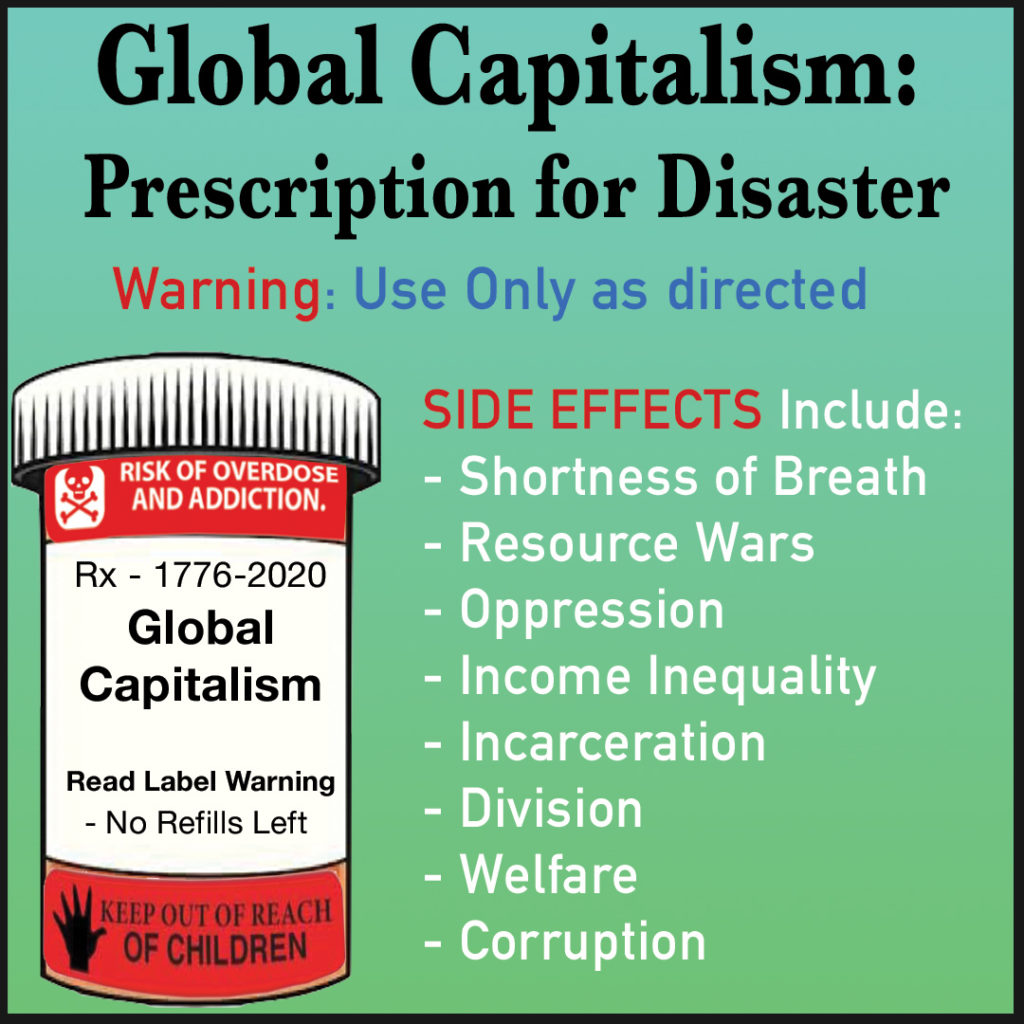
Life is, and probably should remain, a competition, and in competition, it is actually easier to rise to the top than to remain at the top. It is the nature of things to struggle when pushed, and become complacent when not pushed, allowing a narrow window for those underneath to overtake and pass whomever is in front. Thus all things in nature get bigger until they turn fat and slow down, and are left behind, or grow so big, they either collapse from within, or get taken down by the collective.
This ultimately points to the first tenet of the new Economics: balance. How do we stay in the middle of the road? The planet maintains balance by being able to continually recycle itself. Recycling needs to be our second tenet, whether recycling resources, or the financial wealth currently attached to them in the monetary system of our Human Economy.
There is an argument among the wealthy that penalizing them for their “success”, in the form of taxation, disincentivizes them. They also argue that giving anything to the poor would disincentivize them as well. While recycling wealth, we must figure out how to convert income taxation into an investment that benefits all, not just a few.
The argument from the bottom of our financial hierarchy, the minimum wage worker, would be that busting one’s ass and still not being able to secure a living wage disincentivizes them. What also disincentivizes them is the difficulty in securing employment on occasion, especially when their financial circumstances are already tenuous in the first place. They probably do not like the cost of housing, transportation, healthcare or utilities, but we will deal with this, too, momentarily.
The Third Option Solution
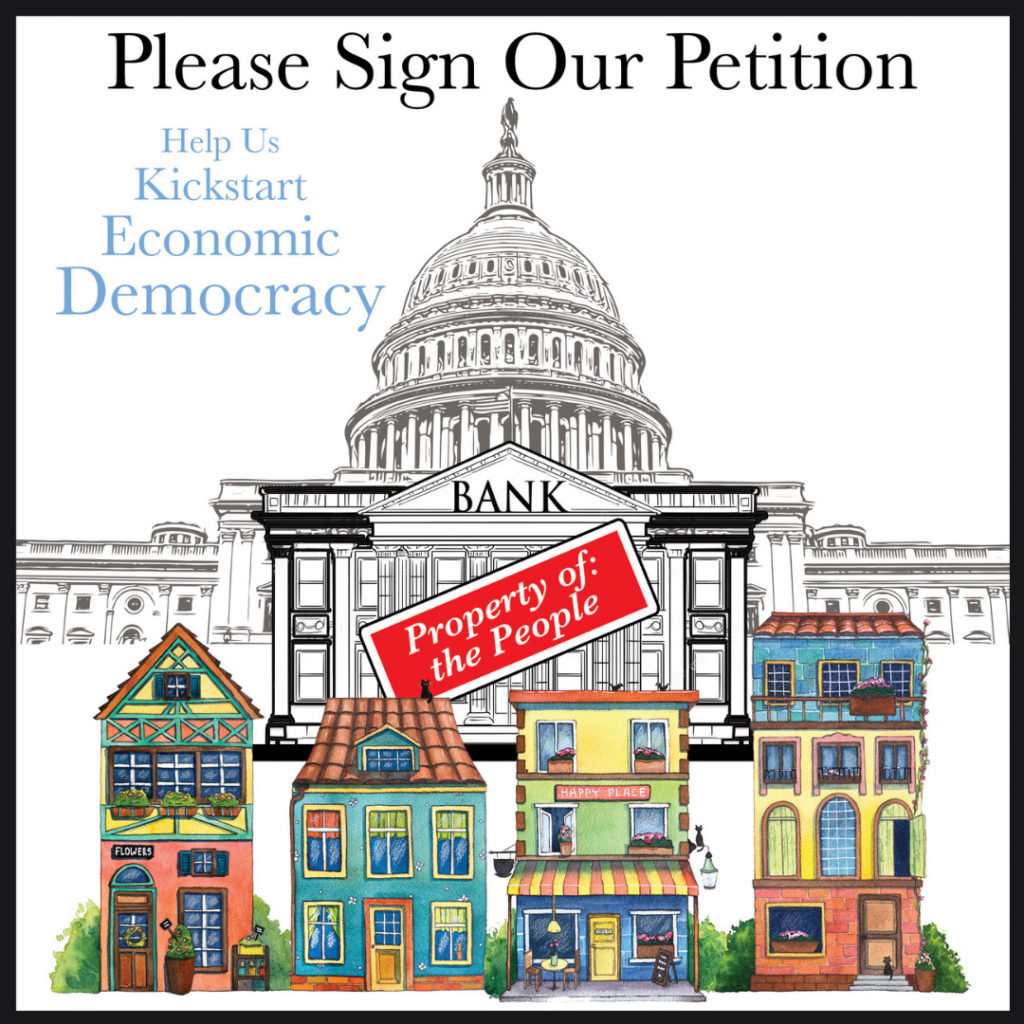
The Third Option offers this solution: we would turn income tax into an investment in whatever needs are deemed essential to human survival. This will involve building infrastructure, and hiring “essential” needs workers to deliver these needs. Meanwhile, we can build the infrastructure “green”, to solve any concerns about the sustainability of our host planet. All this can be managed by Government, which was already handing out basic needs in the form of agriculture subsidies, affordable housing, healthcare, education, et al. Now the Government will be actually delivering the “goods”, instead of taking our money, spreading it around reactively, while never really solving any of these larger issues.
In order to secure the people’s tax investment from any potential government corruption, we would create a National Bank, where tax money goes in untouched, then is allocated, in the form of loans, to local communities. Each community would build the infrastructure and hire employees to provide essential needs. The government would not tack on C-Suite salaries or profit in order to manage these essential needs, rendering them more “affordable” than anything the private sector could offer. The “living wage” would be produced, not by raising salaries, but by lowering the actual “cost” of living. The current “game” of economics could now continue with a safety net equally under each participant.
No one is disincentivized at the bottom, by getting anything handed to them – they still must work in order to get paid – and with a 10% flat tax on all income, no one would be restricted at the top, either.
Because this investment goes into a bank, there would be principle and interest accumulating from the repayment of all community infrastructure loans; these loan repayments will eventually comprise a large “dividend” disbursed equally among all “shareholders” at a designated “retirement age”. Remember: the affordable basic needs produced from these loans, like electricity, housing, water, transportation, healthcare, communication, and agriculture, are not free, they are simply cheap, and the complete repayment of these loans, at 4% interest, has been built into the cost of these essential needs and services. In this newer form of “social security”, every one’s dividend would end up the same, because it is based on the near-equal usage of essential needs by every one.
So what just happened. We simply realized that some resources are essential to human life. Basic economics tells us that these will always be in high demand, thus employment will always be necessary in order to supply them, and a return on investment guaranteed when this demand is met. The Democracy box gets checked, as our unalienable right to life, liberty, and pursuit of happiness is secured through guaranteeing essential needs in exchange for the labor needed to procure them. Also solved is the sticky problem that, in our current system, a few wealthy people have been allowed to own the rights to every one else’s rights, but because we have failed to define our rights in tangible terms, like food, shelter, or healthcare, we have no avenue to convert a minimum wage into an actual “living wage”.
Investing In Infrastructure
Further, we turned our infrastructure – usually a business “expense” – into an investment, taking it out of the debit column, and moving it onto the credit side of the equation. By creating our own money, instead of letting the private banking industry do it, the government (which gives money its value in the first place) can convert many things, once considered expenses, into useful revenue, like the aforementioned retirement dividend.
Securing Our Rights
Finally, government could fulfill its original purpose – to secure our rights – and can do it for one-tenth its current cost, since it would now empower its people to provide their own relief, rather than dole out relief in its current inefficient and ineffective manner. By the way, efficiency and effectiveness will continue to be tenets in the New Economics. To keep it simple, we could call this new version “Economic Democracy”.
